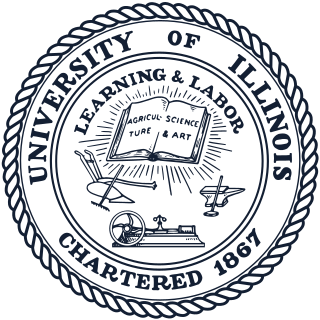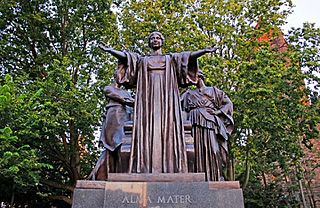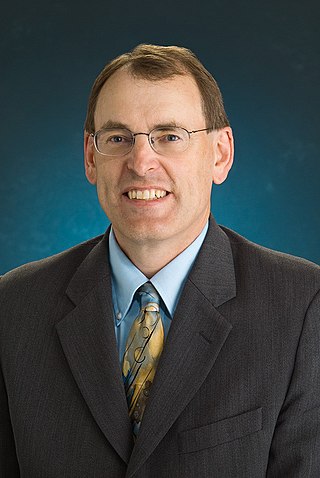
The University of Illinois System is a system of public universities in the U.S. state of Illinois consisting of three universities: Chicago, Springfield, and Urbana-Champaign. Across its three universities, the University of Illinois System enrolls more than 94,000 students. It had an operating budget of $7.18 billion in 2021.

The University of Illinois Urbana-Champaign is a public land-grant research university in Champaign, Illinois, and Urbana, Illinois. It is the flagship institution of the University of Illinois system and was founded in 1867. With over 56,000 students, the University of Illinois is one of the largest public universities by enrollment in the United States.

The University of Illinois Urbana-Champaign is an academic research institution that is the flagship campus of the University of Illinois System. Since its founding in 1867, it has resided and expanded between the twin cities of Champaign and Urbana in the State of Illinois. Some portions are in Urbana Township.
Bioprocess engineering, also biochemical engineering, is a specialization of chemical engineering or biological engineering. It deals with the design and development of equipment and processes for the manufacturing of products such as agriculture, food, feed, pharmaceuticals, nutraceuticals, chemicals, and polymers and paper from biological materials & treatment of waste water. Bioprocess engineering is a conglomerate of mathematics, biology and industrial design, and consists of various spectrums like the design and study of bioreactors to the creation of kinetic models. It also deals with studying various biotechnological processes used in industries for large scale production of biological product for optimization of yield in the end product and the quality of end product. Bioprocess engineering may include the work of mechanical, electrical, and industrial engineers to apply principles of their disciplines to processes based on using living cells or sub component of such cells.
Mary Ann Lila is the director of N.C. State University's Plants for Human Health Institute (PHHI) located at the North Carolina Research Campus in Kannapolis, North Carolina. The institute is part of N.C. State's College of Agriculture and Life Sciences. In her role with PHHI, Lila is a David H. Murdock Distinguished Professor and part of N.C. State's Department of Food, Bioprocessing and Nutrition Sciences. She is a researcher and has been called "the rock star of blueberry research."
North Carolina State University's College of Agriculture and Life Sciences (CALS) is the fourth largest college in the university and one of the largest colleges of its kind in the nation, with nearly 3,400 students pursuing associate, bachelor's, master's and doctoral degrees and 1,300 on-campus and 700 off-campus faculty and staff members.

The Grainger College of Engineering is the engineering college of the University of Illinois at Urbana-Champaign. It was established in 1868 and is considered one of the original units of the school.
The Prairie Research Institute is a multidisciplinary research institute charged with providing objective research, expertise, and data on the natural and cultural resources of Illinois. It was established as a unit of the University of Illinois at Urbana-Champaign by a Public Act of the Illinois State Legislature in 2008. The institute comprises four state scientific surveys: the Illinois Natural History Survey (INHS), the Illinois State Archaeological Survey (ISAS), the Illinois State Geological Survey (ISGS), and the Illinois State Water Survey (ISWS), and the institute also houses the Illinois Sustainable Technology Center (ISTC). The institute has a combined total staff of more than 700 employees, with facilities located on the Urbana-Champaign campus of the University of Illinois, and field offices and research stations throughout the state.
Isabel Bevier was one of the pioneers in the development of the scientific study of women’s labor in the home, today known as "home economics". In 1900 she began developing the “household science” program at the University of Illinois at Urbana-Champaign.

The history of the University of Illinois Urbana-Champaign dates back to 1862. U of I is a public research-intensive university in the U.S. state of Illinois. A land-grant university, it is the flagship campus of the University of Illinois system. The University of Illinois Urbana-Champaign opened on March 2, 1868, and is the second oldest public university in the state, and is a founding member of the Big Ten Conference.
The Carle Illinois College of Medicine is the medical school of the University of Illinois Urbana-Champaign. Called the "World's First Engineering-Based College of Medicine," the school trains physician-innovators by integrating several engineering and entrepreneurship approaches into its medical training, and awards the degree of M.D. upon graduation.
Nadya Mason is the Rosalyn Sussman Yalow Professor of Physics at the University of Illinois at Urbana-Champaign. As a condensed matter experimentalist, she works on the quantum limits of low-dimensional systems. Mason is the Director of the Illinois Materials Research Science and Engineering Center (I-MRSEC) and, since September 2022, the Director of the Beckman Institute for Advanced Science and Technology. She is the first woman and woman of color to work as the director at the institute. In 2021, she was elected to the National Academy of Sciences.
Joan Huber is an American sociologist and professor emeritus of sociology at Ohio State University. Huber served as the 79th president of the American Sociological Association in 1989. Huber taught at the University of Notre Dame from 1967 to 1971, eventually moving to Illinois, where she taught at the University of Illinois at Urbana/Champaign. While instructing numerous sociology courses at the University of Illinois at Urbana/Champaign, Huber served as the director of Women's Studies Program for two years (1978–1980), and then became the head of the Department of Sociology in 1979 until 1983. In 1984, Huber left Illinois for an opportunity at the Ohio State University, where she became the dean of the College of Social and Behavioral Sciences, coordinating dean of the Colleges of the Arts and Sciences, and senior vice president for academic affairs and university provost. During her time, Huber was president of Sociologists for Women in Society from 1972 to 1974, the Midwest Sociological Society from 1979 to 1980, and the American Sociological Association from 1988 to 1989. Being highly recognized for her excellence, in 1985 Huber was given the Jessie Bernard Award by the American Sociological Association. Not only was Huber an instructor of sociology at multiple institutions or president of different organization, she also served different editorial review boards, research committees, and counseled and directed many institutions on their sociology departments.

Scott H. Irwin is the Laurence J. Norton Chair of Agricultural Marketing and professor in the department of agricultural and consumer economics at University of Illinois Urbana-Champaign.
Peter Kenneth Dorhout is a professor of chemistry and the vice president for research at Iowa State University. He was the 2018 President of the American Chemical Society (ACS). As an advocate for science, he has had the opportunity to talk to United States congressional staff about the importance of basic science funding through the National Science Foundation.
Megan Konar is a scientist and Associate Professor of Civil and Environmental Engineering at the University of Illinois at Urbana-Champaign. Konar’s research focuses on the intersection of food, water, and trade. She studies the connection between hydrology, environmental science, and economics.
Andrew G. Alleyne is the Dean of the College of Science and Engineering at the University of Minnesota. He was previously the Ralph M. and Catherine V. Fisher Professor in Engineering and Director of the National Science Foundation Engineering Research Center on Power Optimization of Electro Thermal Systems at the University of Illinois Urbana-Champaign. His work considers decision making in complex physical systems. He is a fellow of the American Society of Mechanical Engineers, Institute of Electrical and Electronics Engineers, and the American Association for the Advancement of Science.

Donald Richard Ort is an American botanist and biochemist. He is the Robert Emerson Professor of Plant Biology and Crop Sciences at the University of Illinois at Urbana-Champaign where he works on improving crop productivity and resilience to climate change by redesigning photosynthesis. He is a member of the National Academy of Sciences (NAS) and a fellow of the American Association for the Advancement of Science (AAAS) and American Society of Plant Biologists (ASPB).

Walter A. Hill is an American scientist who is Professor and Dean of the College of Agriculture, Environment and Nutrition Sciences at Tuskegee University. In 2016 he was inducted into the U.S. Department of Agriculture's National Institute of Food and Agriculture Hall of Fame.
Sharon Marie Donovan is an American dietitian. She holds the Melissa M. Noel Endowed Chair in Nutrition and Health at the University of Illinois at Urbana–Champaign and heads the Donovan Lab. In 2017, she was elected a member of the National Academy of Medicine.







